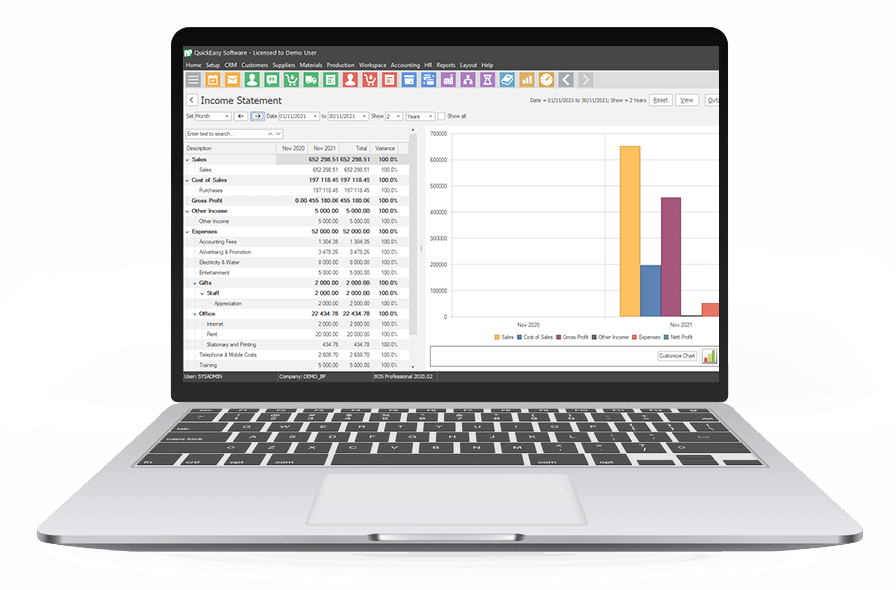Why Local ERP is (Still) Better for Local Businesses

The saying goes, “Think globally, act locally.” This is not a new thought for South African audiences, particularly in the aftermath of Covid-19 and lockdown. Local business owners are campaigning all over social media and with the shared phone, messages to ‘Support local industries’ during this time, and more consumers are opting for locally-sourced products.
With the state of the economy and the exchange rate, the financial benefits of buying locally are abundantly clear. However, there is more to it than that. There is the spirit of ubuntu, of community, that drives much of this along. This is what makes us intrinsically South African.
But First, What is ERP and Why Does it Matter?
Enterprise Resource Planning (ERP) is the term coined by Gartner in the mid-’90s for the integrated business software solution that helps organisations allocate their resources effectively. Initially, ERPs were not for everyone: they were prohibitively expensive to implement and use, they were brazenly inflexible, and unbelievably difficult to maintain, often resulting in the need for full-time, very expensive consultants. Consequently, only the elite few saw the benefits of this integrated, automated solution.
Thankfully, this is no longer the case. Modern, cloud-enabled ERP is more affordable, quicker to deploy, and is so flexible it conforms to your business’s operational needs, and not the other way around.
So, why use ERP?

1. Because ERP Works
The right ERP in the hands of the right implementation partner offers measurable, tangible benefits, including a central place for all data and processes, streamlined interdepartmental and inter-company operations, plus instant and accurate business analytics and insights.
Unlike legacy ERP or patchwork, non-communicative applications, when configured and used correctly, ERP can power organisations of all sizes and sectors, with multiple locations, multiple currencies, multiple entities, streamlining operations and integrating processes, thereby increasing profits and lowering costs across the enterprise.
Additionally, access to real-time, accurate information, that is as big-picture or granular as you like, ensures businesses can make changes at speed, remain agile, reduce waste, forecast effectively, and remain competitive in a down-economy.
2. Because Centralisation is That Important
Enterprises with complex operations, with multi-location, multi-process, multi-currency requirements, with dispersed staff, and aggressive growth plans, cannot afford to stick with their outdated, rigid ERP systems, or with patchwork applications that expose them to human error and risk.
When systems are incompatible, too expensive to maintain, outdated, or are unable to be serviced or upgraded, it causes manifold problems for businesses.
Due to ERP software’s ability to streamline every part of a business — from sales, human resources, stock control and replenishment, to finances and business management reports — the time-saving, clarity, and control benefits of a centralised system for these organisations cannot be emphasised enough.
When a unified system is in place — the hallmark of an ERP system — it drastically cuts operational costs, as they help automate processes, increase productivity, reduce or reassign headcount and retire costly legacy systems.
3. Because of Constant Improvements in the ERP Space
The introduction of local ERP solutions for midsized companies saw local ERP stalwarts, QuickEasy Software, leverage cloud technologies to produce even more flexible, budget-friendly ERP solutions, particularly to the local market.
These cost reductions, and the anytime, anywhere accessibility advantages of the cloud, make it that much easier for mid-sized entities to implement ERP systems. Combining that with the benefits of artificial intelligence (AI) and robotic process automation (RPA), modern ERP is the only way for businesses to keep up with increasing data processing and analysis demands.
In lieu of that, here are the reasons why local ERP really is better.

The Advantages of Investing in Local ERP
There are a number of reasons why locally developed ERP solutions should be considered when you are ready to upgrade from your legacy system or to initiate an ERP implementation project. The main advantages are with the ERP products themselves, your access to support and, of course, price.
1. You Get a Better Product
First and foremost, the benefit of a locally-developed ERP is that it has been designed with the local market in mind. International ERP is typically made for mass markets, so you might end up with “whatever’s in the box” and that’s it, whereas ERP developed locally is done by South Africans with South African challenges in mind. As a result, you don’t end up paying an arm and a leg for a solution with a long list of irrelevant features that don’t apply to our local requirements.
Secondly, there is a tremendous advantage if you, as the client, have a direct, positive relationship with the supplier themselves. This can often result in faster, personalised iterations of the software’s upgrade schedule.
Finally, local ERP is often of better quality than the international products that come in at the same price, as they are not bloated by import taxes or exchange rate fluctuations. Additionally, local development teams are typically highly capable, with a greater drive to see local ERP support local industries.
2. You Get Better Support
A common frustration for South African business owners is paying support prices in dollars or pounds, and then having to wait for their international ERP support team to wake up. Local support keeps local office hours.
A good-sized local ERP vendor will have offices and consultants in all major South African centres, which means your help is literally a phone call, or a quick drive, away.
More than that, these local consultants come with years of experience in business operations for the local market, and can help you with so much more than just your software, as implementing new ERP on old business processes has never been a good idea.
3. You Get Better Value
Buying local means you have access to full-house ERP at prices that are free from the ever-fluctuating exchange rate. It is as simple as that.
That means you get a robust ERP solution, with powerful functionality, at a better price, simply because you don’t have to factor in international rates. You get more bang for your buck; it just makes business sense.
Want truly local ERP with big-brand functionality?
Chat to a BOS Consultant. They are local ERP experts.

About Anton Oosthuizen
Anton is the Commercial Director of QuickEasy BOS, a South African ERP company that develops and supports business operating systems for organisations in every industry. His passion is to see local organisations streamline operations, reduce waste, and improve efficiencies through providing astonishingly flexible BOS solutions, with local, professional support.

